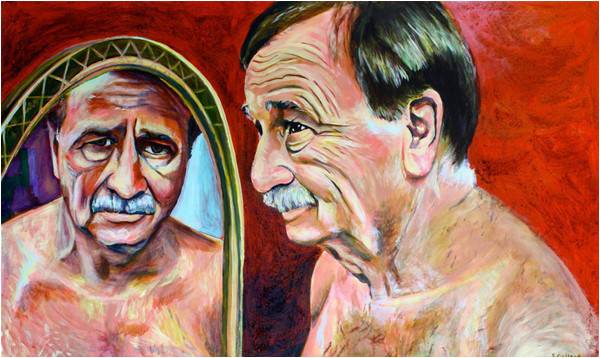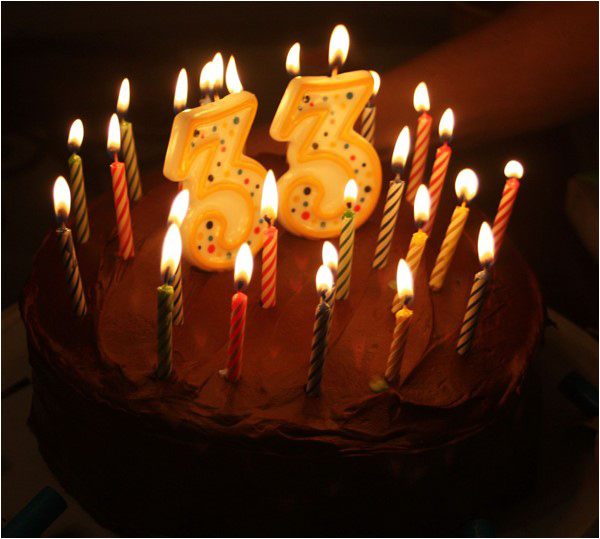
Several years ago, I came across an exhibition in a museum titled ‘Younger than Jesus’. It was a massive show in which the only common denominator was that all the artists were younger than 33 – purportedly the age that Jesus is meant to have died. The title was purposefully provocative, an obvious attention-seeking trope to garner visitors to one of the dozens of shows that exhibits the work of emerging artists – but that hardly anyone actually sees. The show was bad, but the title always stuck with me. Being younger than Jesus myself at the time gave me a measure of relief that I had time yet to accomplish all the Great Things that I knew I would but hadn’t thought about quite just yet. Who knew? Maybe I would be historically significant yet. Perhaps one could ascend to heights unknown, if not actually be resurrected. There was time.
By about my mid twenties, I had begun to suspect that no one really ‘grows up’, a fact I confirmed by 30. It’s a lie that the world propagates with a series of false starts. They begin at your 13th birthday. “You’re not a child anymore!” your relative says while wagging her finger at you. “Time to grow up!” You puff up slightly at the thought that yes, you’re finally not a child anymore. But strap yourself in, little one, because the behemoth of puberty has barely begun its physical assault on you and it’s going to be a bumpy, pimply ride. They say it again at your sweet 16, while all but the most irritating adolescents still look like pizza faces that aspire to promiscuity but settle for late-night television. They say it when you are 18, when the acne has begun to recede but you still haven’t a clue as to what’s going on or what you can do to find out. This time you may actually believe it, because you can get your ID card, you can vote, drive and live alone. But you know you’re still a kid, and if you don’t then you should. Also know that this isn’t a bad thing. They say it more forcefully at 21, when you have begun to think about jobs and careers. After that the birthdays keep on rolling by. 25, 29, 30. By 30 they now begin saying that youth itself has passed you by. “When?!” you gasp, bolting for the mirror to check for receding hairline and expanding waistline.
But the show’s title set in my head the idea that the mid-thirties was it. That was when I would finally be grown up. At the very least it was as good a time as any to call someone a man rather than a boy. By now maybe you’ve launched your career, fallen in love, had your heart broken, had kids, married, divorced. Maybe you’ve been busy and done all of these things. Maybe you’ve been lucky and done none. But chances are that whoever or wherever you are, you’ve made decisions that are binding and longstanding. That’s probably what people mean when they talk about getting older. I’ve noticed that aging to most people is (beyond physical decline) a loss of options. That sense of limitless possibility that stretched forward when you were 18, in which you could be anyone and anything, is now a narrower channel – informed by chance and choice. But no matter how old I get, I don’t subscribe to that idea, because I have always believed that your choices are only as limited as you are.
I was saying all of this to one of the people who was over at my house for my birthday the other day. The best way to celebrate your birthday is to control it, which is what I try and do every year by throwing a small soiree. Of course this means you spend the run up to B-day stressing about plans and by the time people actually arrive you are so done with the idea of partying that you’d rather just curl up with a book and cake. Still, I persevered because it’s always sweet when people accept your invitation.

The general prognosis was that 33 is a weird age to be or celebrate. You’ve already turned 30 so the “loss of youth” jolt has already shocked you but you’re far enough from 40 that it’s not really a problem. You’re kind of in the middle now, and frankly that’s fine. Someone at the party was reminiscing about our twenties, romanticising it in a way I found completely alien. I would never want to be 18 or 21 or 25 again. It sucked. I didn’t like the endless ocean of possibility in front of me because the flip side is that it’s entirely possible to end up as nothing, which is super stressful. In retrospect the person I was speaking to had a very low body fat percentage at 21, so I think we just had different experiences of life, really.
At the end, I am happy at 33, and grateful to modern medicine and laws that meant I have outlived Jesus. Because if his example taught me anything, it’s that there are far worse things that can happen to you by 33 than hair loss!
Write to thekantawala@gmail.com
By about my mid twenties, I had begun to suspect that no one really ‘grows up’, a fact I confirmed by 30. It’s a lie that the world propagates with a series of false starts. They begin at your 13th birthday. “You’re not a child anymore!” your relative says while wagging her finger at you. “Time to grow up!” You puff up slightly at the thought that yes, you’re finally not a child anymore. But strap yourself in, little one, because the behemoth of puberty has barely begun its physical assault on you and it’s going to be a bumpy, pimply ride. They say it again at your sweet 16, while all but the most irritating adolescents still look like pizza faces that aspire to promiscuity but settle for late-night television. They say it when you are 18, when the acne has begun to recede but you still haven’t a clue as to what’s going on or what you can do to find out. This time you may actually believe it, because you can get your ID card, you can vote, drive and live alone. But you know you’re still a kid, and if you don’t then you should. Also know that this isn’t a bad thing. They say it more forcefully at 21, when you have begun to think about jobs and careers. After that the birthdays keep on rolling by. 25, 29, 30. By 30 they now begin saying that youth itself has passed you by. “When?!” you gasp, bolting for the mirror to check for receding hairline and expanding waistline.
I would never want to be 18 or 21 or 25 again. It sucked. I didn't like the endless ocean of possibility in front of me because the flip side is that it's entirely possible to end up as nothing, which is super stressful
But the show’s title set in my head the idea that the mid-thirties was it. That was when I would finally be grown up. At the very least it was as good a time as any to call someone a man rather than a boy. By now maybe you’ve launched your career, fallen in love, had your heart broken, had kids, married, divorced. Maybe you’ve been busy and done all of these things. Maybe you’ve been lucky and done none. But chances are that whoever or wherever you are, you’ve made decisions that are binding and longstanding. That’s probably what people mean when they talk about getting older. I’ve noticed that aging to most people is (beyond physical decline) a loss of options. That sense of limitless possibility that stretched forward when you were 18, in which you could be anyone and anything, is now a narrower channel – informed by chance and choice. But no matter how old I get, I don’t subscribe to that idea, because I have always believed that your choices are only as limited as you are.
I was saying all of this to one of the people who was over at my house for my birthday the other day. The best way to celebrate your birthday is to control it, which is what I try and do every year by throwing a small soiree. Of course this means you spend the run up to B-day stressing about plans and by the time people actually arrive you are so done with the idea of partying that you’d rather just curl up with a book and cake. Still, I persevered because it’s always sweet when people accept your invitation.

The general prognosis was that 33 is a weird age to be or celebrate. You’ve already turned 30 so the “loss of youth” jolt has already shocked you but you’re far enough from 40 that it’s not really a problem. You’re kind of in the middle now, and frankly that’s fine. Someone at the party was reminiscing about our twenties, romanticising it in a way I found completely alien. I would never want to be 18 or 21 or 25 again. It sucked. I didn’t like the endless ocean of possibility in front of me because the flip side is that it’s entirely possible to end up as nothing, which is super stressful. In retrospect the person I was speaking to had a very low body fat percentage at 21, so I think we just had different experiences of life, really.
At the end, I am happy at 33, and grateful to modern medicine and laws that meant I have outlived Jesus. Because if his example taught me anything, it’s that there are far worse things that can happen to you by 33 than hair loss!
Write to thekantawala@gmail.com

